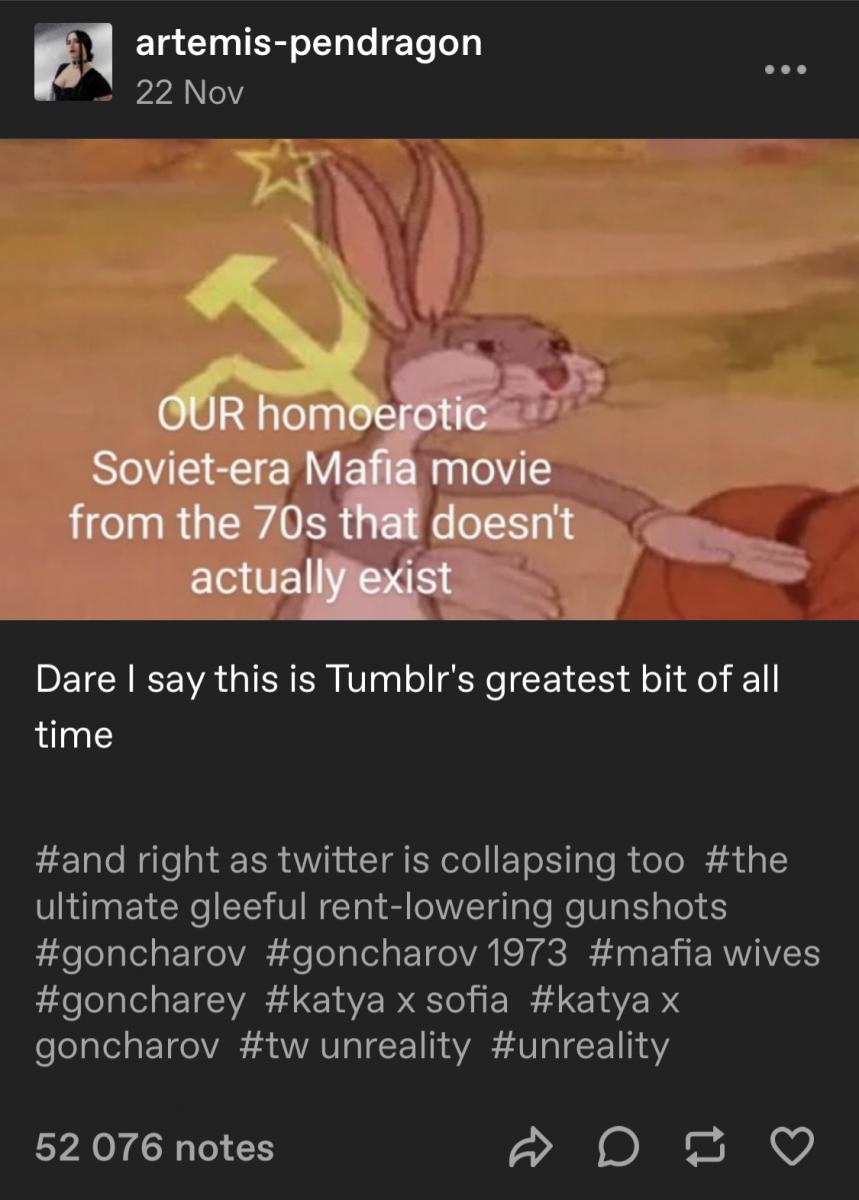
Goncharov: Tumblr’s greatest mafia ‘movie’ and social phenomenon
Have you ever heard of Goncharov, Scorsese’s hidden gem, “greatest mafia movie of all time”, released in 1973 and starring Robert De Niro? Well, if you have no idea what I am talking about, then you probably missed out on one of the most peculiar discourses on the micro-blogging platform Tumblr. Goncharov started as an elaborate inside joke on the social media platform, but later on, it grew into a tight-knit fan community. This phenomenon has grown far beyond a simple meme, which is why this article will question how Goncharov as a user-created form of art reflects the current state of our society.
How did it all start?
Goncharov the movie was mentioned for the first time in a Tumblr post all the way from August 2020. The user, now deactivated, shared a photo of boots they recently got, expressing their confusion about the label on them, which read “The greatest mafia movie ever made. Martin Scorsese presents: Goncharov. About the Naples mafia”. In November of 2022, a repost of the original post with another user's comment saying “this idiot hasn’t seen Goncharov”, as pictured in Figure 1, suddenly went viral on the platform.

Figure 1. The original post and the comment under it reposted by the user @losermo
What followed the virality of the original post were thousands of Tumblr users coming together to not only participate in the joke but also create the lore and fandom for the non-existent Scorsese movie. Currently, all the information about Goncharov is being gathered in a Google Doc file created by the user Connanro, it includes extensive descriptions of characters, the plot, specific scenes, music, and all the possible imaginable parts of an actual film. It also links other archives, the screenplay, the soundtrack, analyses, adaptations, and theories, as well as the official poster of the movie (Figure 2).

Figure 2. Goncharov movie poster made by Alex Korotchuk aka @Beelzebubesque on Twitter
All the aforementioned information was collectively created and gathered by social media users, namely on Tumblr, Reddit and in Discord private servers. Furthermore, the fictional movie acquired its very own fandom on Tumblr and beyond, as the users create fan art of their favorite pairs (or, as the users usually call them, ships), write fanfiction and discuss the topics mentioned in the “film”. The viral joke has since spread far beyond its platform of origin, with Twitter and Tiktok users making content about Goncharov, and even celebrities such as Lydia Carter and Ryan Reynolds joining in to post about the greatest mafia “movie”. A Tiktok made by Scorsese’s daughter Francesca shows her father reacting to Goncharov through text messages, stating that he ‘made this film years ago’.
Why do online inside jokes become passion projects?
Goncharov is certainly not the first venture of internet users to make what was first simply a meme into a full-blown art piece. During quarantine days, the Ratatouille musical met the same fate - Tiktok users first discussing a Broadway adaptation of a Disney film merely as a joke. Later it went on to become an actual musical, created through the contributions of thousands of people online. While Goncharov has not yet had any real-life manifestations as an actual film, it definitely brought together a whole community of creative minds. But is there a reason behind the internet being fast to jump on a bandwagon of very elaborate online passion projects, creating detailed imaginary worlds?
One might argue that this sudden ‘craving’ that internet users have been having for collaboration and creativity might be due to boredom. After all, people have spent at least a year in isolation due to the pandemic, leading to a combination of overstimulation with the constant consumption of online media and crave for human interaction. As described by Fisher et al. (2018), society exists in a state of boredom and compulsion due to a constant flow of entertainment. Consequently, this urges people to create their own content and interact with it, for the sake of avoiding boredom. As seen previously, through the example of Ratatouille the musical, such a cultural phenomenon is not new or surprising and is just another thing people online decided to do to amuse themselves.
People find themselves interested and eager to participate in projects that both evoke their nostalgia and enable them to combine it with their longing for social change
Another article written by Fisher (2013) describes the nostalgia that has been prominent in our culture in the past two decades, which definitely had its impact on the popularization of Goncharov among internet users. Retro aesthetics are prominent in all creative fields lately and is extremely popular on social media, including Tumblr, be it blogs that post screenshots and gifs from old films or photos made to look like they were taken with a film camera somewhere in the ‘80s. Seeing people obsessed with a film seemingly from the 1970s was not out of the ordinary, and neither was their desire to produce retro-esque content. Fisher (2013) links today’s cultural stagnation and the emergence of nostalgia with the longing for political change. Similarly to activists of the 20th century, the people are still longing for development. The lore created by the users for Goncharov attests to this state since one of the main topics of discussion within its plot is the search for identity. This is combined with other themes that the users decided to include, such as poverty and social class, as well as gender and sexuality, which are closely connected with the activism of previous days and now. Therefore, people find themselves interested and eager to participate in projects that both evoke their nostalgia and enable them to combine it with their longing for social change.
Goncharov and Queer Activism
As established, the online user interest in Goncharov can be connected to the nostalgia train and portray a certain stagnancy in social justice. However, it also shows that the users are still engaging in discussions about such important cultural and social topics as one’s identity. It could be a signal that our society is ready to speak up and enact change, using the fictional past as an example of what could have been if people were ready for action. After all, Tumblr as a platform is known for being widely used by queer people, and often hosts discussions on social issues connected to the LGBTQ+ (Byron & Robards, 2017). It comes as no surprise then that a fictional movie created by Tumblr users would also act as their outlet for commentary on queerness in film and media.
A Tumblr post made by user Punk Bot (2022) interconnects the topics of gender and sexuality with the year Goncharov was supposedly created, stating that all the theories on implied homoeroticism and portrayal of trans masculinity in the “film” reflect both our current era and one of the 1970s. Goncharov as a movie is often described as “forgotten due to its progressive nature”, and Punk Bot relates it to how the ‘70s is a generally forgotten era for culture as well. The reason for this erasure? The raising inclusion of queer themes. As an example to Goncharov, the user presents the first Star Wars film, which featured general themes of oppression which could be interpreted as queer-coded. However, queer topics in media died down after that, due to the AIDS epidemic and overall hateful backlash. But, as we can see, LGBTQ+ topics in media are now reemerging, on an even greater scale than they did 50 years ago. While this does not erase the stagnancy we are experiencing currently with the rights of queer people in the world, a readiness for change is noticeable with how eager the public is to both create and consume queer media, as well as engage in discussions on sexuality and gender.
Revival of Tumblr
Another judgment that can be done from the whole Goncharov situation is that the way we use social media is gradually changing. Before this year Tumblr was often referred to as a dead platform, only acting as a niche community for fandoms rather than being mainstream and widely used like Instagram or Twitter. However, in 2022, Tumblr has been having upsurges in visitors due to various reasons. One of the bigger ones is the previously mentioned nostalgia - Tumblr encompasses formats of the older internet such as blogs and, in a way, forums. It allows the users to remain as anonymous as they would like, does not focus on post engagement and followings, and exists within its own niche without trying to copy other successful social media features. This slowly falls in with the other reason for the sudden revival of Tumblr - the recent faults within other social media. After Elon Musk bought Twitter, the user base started massively migrating to Tumblr - downloads for the app on iOS went up 62% that week (Tiffany, 2022).
While the brought back popularity of Tumblr as a platform can be deemed a coincidence, it raises the question of why we suddenly feel the need to change our social media use habits. After all, Tumblr is quite different even from Twitter - favoring long-form content, not having any sort of influencer culture or, for that matter, even verification (except for a joking feature Tumblr did last month, where any user could buy two checkmarks for themselves). Goncharov as a Tumblr trend is a perfect example of how eager users are to deviate from the formats of current social media giants. Applying what Busta wrote in her article on modern counterculture (2022), more and more users are going against the power giants which are Facebook, with its Instagram, and Twitter, now owned by a multi-billionaire Musk. Instead choosing to express themselves by, in this case, working as a community to build a fictional world for a fake Scorsese film and discuss social topics throughout the scope of it. As users are connecting Goncharov with the revival of Tumblr and the collapse of Twitter (Figure 3), perhaps, the situation shows a possible beginning for a new era of social media, the internet, and our society.

Figure 3. A screenshot of a Tumblr post from the user artemis-pendragon
Final thoughts on Goncharov
While Goncharov may not even be a real film, the discourse around it has shown how passionate and close-knit internet communities can be while working on a shared project. It has also shown the current state of the internet, our society, and even where we are heading, both online and offline.
While Goncharov may not even be a real film, the discourse around it has shown how passionate and close-knit internet communities can be while working on a shared project
Firstly, it shows the post-pandemic boredom state (or even one that we were in long before 2020) we exist in currently. One where users online unite to create their own content from the need for constant stimulation and, simultaneously, a longing for the old and the new. Goncharov has also been a reflection on modern-day tendencies in activism, while Tumblr’s ‘project’ was not initially related to queer identities, the users decided to use it as an outlet for discussion. It shows that while there are no visible changes being made by activists currently, society is more than ready to start said change - speaking out on the issues through the lens of a fake 20th-century mafia film. And, lastly, Goncharov has shown a shift in our use of social media. Deviating from the influencer culture and the visually polished notion of current social media giants, the users have shown their craving for different, more authentic, and real-to-self, forms of interactions. Goncharov acted as a showcase of what forms of content the internet might shift to since so many users were eager to engage with creating and discussing the film and so many have abandoned other popular platforms in favor of ones that are similar to Tumblr.
References
Busta, C. (2022, November 2). The internet didn’t kill counterculture—you just won’t find it on Instagram. Document Journal.
Byron, P., & Robards, B. (2017, May 29). There’s something queer about Tumblr. The Conversation.
Fisher, M. (2013, June). “A social and psychic revolution of almost inconceivable magnitude”: Popular Culture’s Interrupted Accelerationist Dreams. E-flux Journal.
Fisher, M., Ambrose, D., & Reynolds, S. (2018). K-punk: The Collected and Unpublished Writings of Mark Fisher (New edition). Repeater.
Punk Bot. (2022, November 26). Goncharov, Star Wars, Stonewall, and Disco, and the 1970s: an epiphany. Tumblr.
Tiffany, K. (2022, November 18). Tumblr Gets the Last Laugh. The Atlantic.